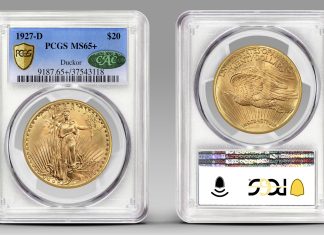 After briefly poking above the $1,600 mark during the trading day on Thursday, gold prices resumed their march towards lower value ground and were once again seen touching the $1,585 level by the late evening hour in New York.
After briefly poking above the $1,600 mark during the trading day on Thursday, gold prices resumed their march towards lower value ground and were once again seen touching the $1,585 level by the late evening hour in New York.
With gold prices orbiting near 17-week lows there are naturally quite a number of questions surrounding the yellow metal’s near and medium-term fate and a couple of institutional firms (Barclays Capital sees an average of $1,716 gold this year) have cautiously reduced their forecast for bullion with regard to those time frames. In technical terms, there is little in the way of chart support for gold until the $1,527 level is touched (and is being hoped for to hold up) and such an excursion could take place in short order.
However, with daily sentiment indices hovering at lows of around only 10% bulls, there is a decent chance that a counter-trend pop could be witnessed over coming sessions and that some repair work could be undertaken. Mind you, the scope of such repairs at this point has become almost a ‘wholesale remodel.’ At any rate, the weekly Bloomberg News survey of analysts indicates that they are now the least bullish they have been in five weeks’ time. Chart-wise, the gold bulls cannot begin to snort and trot until and unless price tags reach well above $1,650 on a closing basis for a couple of sessions.
With the US dollar around 80.30 on the index, with crude oil under $96 per barrel and with the euro not overcoming the $1.30 critical mark despite some easing in Europe-centric anxieties, such a feat might have to wait for some time. In fact the euro dipped to three-and-a-half month lows overnight. Yesterday’s (small) dip in U.S. jobless claims filings did not play into the gold bulls’ hands either. Overnight and this morning, the situation was no brighter as despite the lack of a sizeable advance in the dollar gold prices slipped to lows near $1,570 while silver fell to under the $28.50 mark in electronic trading prior to the market’s opening in New York. Platinum touched lows at $1,455 while palladium actually dipped under the $600 level for a brief time.
In the "lessons we could all learn from" department, intrepid Kitco News reporter Daniela Cambone interviewed Mr. Kevin O’ Leary (who, for Canadians, needs no introduction) and came away with quite the harvest of sage and level-headed observation on gold, gold shares, and putting one’s money into either. Take it from someone who’s worth quite some numbers: "Gold is a stabilizer, it is an insurance policy." As well, "I have owned gold for decades and I simply have 5% weighting."
Finally, Mr. O’Leary cautioned that:
"When everyone is saying you gotta own it [gold], you should be selling it because when it corrects it doesn’t touch the sides [of the chute] on the way down."
Mr. O’Leary is likely to credit his ability to have amassed a fortune to discipline, and to not ever having owned more than 20% in any sector. We will not repeat what he noted about gold miners right here, right now. The clip and the article in the above link are all you need. Let’s just call it the "Cold, Hard Truth." Mr. O’Leary sure does. Bravo. There goes the prize for the most valuable (in every sense of the word) interview of the year.
Meanwhile, no surprise, in the wake of this week’s epic wash-out in the metals; a plethora of still-bullish commentaries have been hastily penned over the past several days, with most of them, curiously, alluding to the very same events in Europe that have driven precious metals to their current level as being utterly bullish for them. Why, even allegedly evil-minded, market-manipulating firm Goldman Sachs came out with a reaffirmation of its faith that gold prices will once again touch… $1,840 an ounce (in the next six months, to boot). Not perhaps what dyed-in-the-alloy gold bugs wanted to really hear, but… good enough for now.
In any case, the faint (but soon to be beeping loudly about this) market radar last night picked up a bit of wild (to the tune of $2 billion) news. Evidently, the other putatively "sinister’ metals market suppressor — JP Morgan incurred a trading loss of such a whopping magnitude owing to the "skills" of a rogue trader codenamed the "London Whale." Now, we know that many of you reading these lines are hoping to learn that this cetacean lost shovelfuls of money on some kind of gold or silver positions gone sour, but, alas, that is not the case.
In fact, the JPM loss put an additional price dent into risk assets worldwide this morning. One Mr. Bruno Iksil simply sold a whaling boat load-full of CDSs to assorted hedge funds. That move came back to bite the firm more severely than Moby Dick ever bit Captain Ahab. The firm did not lose a leg perhaps, but it did shed more than 7% in its stock value after-hours. Ahoy, losses.
Something else that went quietly under the market’s radar was the news that the US government (yes, that ‘gubmint’) posted its first monthly budget… surplus (!) since late 2008 this April. Uncle Sam was in the black to the tune of $59 billion last month, go figure. That’s one for Ripley’s "what are the odds of that?" kind of questions, but it is a fact. It is the first such surfeit for the Obama administration and it is likely to not "go over" very well in the Romney election camp, or on Fox News for that matter, even if it is not (yet) a game-changer overall.
Meanwhile, the steady stream of hawkish-flavored statements coming from the Fed (if not yet Mr. Bernanke himself) continues to flow and it is perhaps quietly re-shaping investor attitudes. Think easy "easy money" is the new normal? Think it is here to stay and that the Fed is powerless to alter course? Think again. On Wednesday, NY Fed President Dudley said that the US central bank "will bring quantitative easing to a halt the moment it becomes inconsistent with the Fed’s dual mandate objectives." Dual as in: employment and inflation targets.
Moreover, Minneapolis Fed President Narayana Kocherlakota yesterday asserted that US unemployment levels may not have a whole lot of room to go lower (read: we are near full employment and the inflation risk posed by zero rates is not worth the pursuit of the last percentage or two in joblessness levels; not if there has been a permanent erosion in the labor force which is now likely here to stay, such as has been the case in Sweden, for example). Mr. Kocherlakota said that "If the [FOMC} were to agree with my prognosis that we should be initiating exit in six to nine months, you would want to change the language of that [current Fed policy] statement even sooner."
More market news on tap — this time from China. Again. First, the temperature reading on the country’s inflation thermometer showed a rate of 3.4% in April. Yes, that figure is two-tenths of a percent beneath the March number but it also came in above the government’s target. Among the principal culprits were food prices (which albeit lower than March as well, still rose at a 7% pace). On another front, the country revealed trade data that was anything but encouraging. A dip in demand caused annualized export growth levels to slide to 4.9% last month as against expectations of around 8.5% by economists.
April was not kind to the Chinese economy. Output, retail sales, consumer prices, all slipped. Industrial output was actually the slowest in three years and fixed asset investment growth came it at the lowest reading in nearly ten years. New lending activity was indicated at significantly below the expectations of the majority of market analysts. One metric that is normally quite a good barometer of what is happening in the economy, power output growth… did not; it eked out a less-than-one-percent gain.
On the heels of all that type of news, China Mining.org reports this morning that Chinese gold demand may actually stagnate this year not only because of sliding prices but also in the wake of the country’s slowing economic growth. The country’s largest jewelry fabricator, Lao Feng Xiang Co., cast doubts on recent World Gold Council estimates that China might be able to surpass India as the world’s largest gold consumer.
As things stand right now, despite some headlines we have been offered of late, China has experienced its worst gold jewelry industry conditions since the financial upheaval of 2008. The firm’s VP noted, "The expectations that gold prices will always rise and that gold’s value can only appreciate seems to have faded." He also reminded folks that — after having been in business for 70 years: "We’ve seen cycles." Well, at least he can.
Speaking of cycles and such, it might interest you to learn that (among other similar events) the end of the world as we know it has been… rescheduled. An earlier version of the by-now-famous Mayan calendar has been located in Guatemala and the conclusion is that we all have ample time left before we need to worry about Armageddon. Perhaps as much as 6,700 years, give or take… in other words, quite enough of an opportunity to get our lives in order and figure out our priorities. That includes the ones related to our money and what to do with it.
Have a pleasant weekend.
Jon Nadler
Senior Metals Analyst — Kitco Metals
Jon Nadler
Senior Metal Analyst
Kitco Metals Inc.
North America
Disclaimer: The views expressed in this article are those of the author and may not reflect those of Kitco Metals Inc. The author has made every effort to ensure accuracy of information provided; however, neither Kitco Metals Inc. nor the author can guarantee such accuracy. This article is strictly for informational purposes only. It is not a solicitation to make any exchange in precious metal products, commodities, securities or other financial instruments. Kitco Metals Inc. and the author of this article do not accept culpability for losses and/ or damages arising from the use of this publication.
www.kitco.com and www.kitco.cn
Blog: http://www.kitco.com/ind/index.html#nadler










